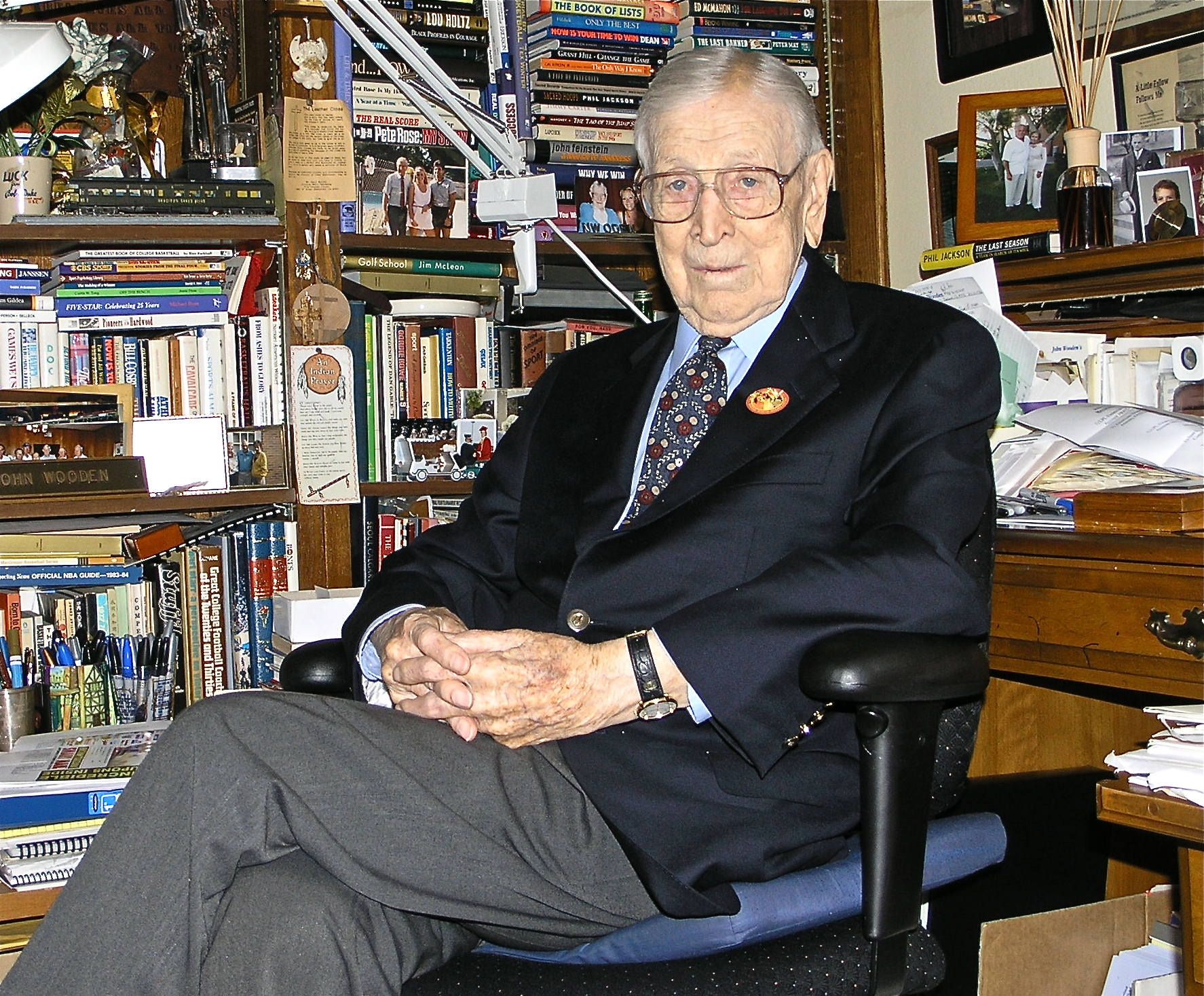By Phillip B. Sparling
John Wooden 1910-2010. The numbers are exceptional—a century of living. A long life is a notable achievement in itself, and even rarer if one’s decline in the latter years remains slight until the end. Mr. Wooden led such a life, remaining active into his late-90s. Wooden is a name many recognize. Indeed, I am referring to the famous and beloved coach of college basketball, John Wooden of UCLA.

Sports fans lionized Coach Wooden for his unsurpassed win-loss record, including 10 NCAA Championships and an 88-game winning streak. He was admired by a wider audience of educators, parents, and ordinary folk for his integrity, humility and devotion to principle. Articulate and respectful, he believed success—whether in sports or other aspects of life—came through a combination of hard work and cooperation guided by thoughtful analysis and preparation. He was the real deal.
He was raised in an Indiana farmhouse before electricity and indoor plumbing. Like classic stories about rural settlements, his early education was in a one-room schoolhouse. He became an outstanding basketball player in high school and at Purdue University, where he was the first player to be named a three-time consensus All-American. Decades later, he would be inducted into the Basketball Hall of Fame as both a player (1960) and a coach (1973), the first to be doubly honored.
John Wooden excelled in the classroom too, earning his college degree in English. His Midwestern values of diligence and education were deeply ingrained. He firmly believed in the power of writing for planning and guidance. As a high school teacher and coach during the 1930s, he developed his famous program, The Pyramid of Success, a step-by-step philosophy for winning at basketball and at life.
He always carried a worn slip of paper listing seven maxims from his father Joshua. Here are three:
- Be true to yourself
- Help others
- Build a shelter against a rainy day
The process of writing down special beliefs or aims and having them available for inspiration and guidance is so simple its merit is easy to discount. Handwritten reminders help us stay on track, reach goals and ground us. Rediscover your own slips of paper. A quote I’ve carried in my wallet for decades: “Doubts are more cruel than the worst of truths.” ~Moliere.
Writing can empower in different ways. Important but overlooked is the value to the individual for personal development. Elemental, practical writing can help one make changes. This type of writing isn’t blogging or writing for publication, nor is it excessive self-analysis. Rather it’s a straightforward, time-tested way to organize one’s thoughts and implement a plan.
As Coach Wooden often declared, failing to prepare is preparing to fail.Be thoughtful and realistic. Your plan should not necessarily be what you should do: strictly following official or generic recommendations. Instead, decide what you are willing to doin the short term, say for the next month. Write the plan out and keep a log of your activities. For example, if your daily dietary goal is to eat five servings of fresh fruits and vegetables, make a list every day after the evening meal; let’s see—a peach with breakfast, cantaloupe and tomato at lunch, and green beans and a sweet potato for dinner.
You may not achieve your goal every day but that’s alright. Record whatever you do and make entries every day. Professionals recommend keeping logs because they know it helps individuals make desired changes. A written record makes one more aware by reinforcing achievements and charting progress. After a month, review your log, adjust your plan as necessary, and continue. The aim is to establish a routine that, with time, will become a habit.
A humble Midwesterner with exceptional talents, John Wooden tried to live by the principles his parents instilled in him. He understood writing is enabling and practiced that principle throughout his long life. Three other homilies on the list from his father were: Drink deeply from good books, especially the Bible. Make friendship a fine art. Count and give thanks for your blessings every day.
Coach Wooden would likely agree that the wonder of a full life is best realized if built on a foundation of learning, diligence, purpose, and good will. The seventh loving directive from Joshua Wooden to his son John was: Make each day a masterpiece.
***
Talent is God-given. Be humble.
Fame is man-given. Be grateful.
Conceit is self-given. Be careful.
~John Wooden
***
This essay is from a collection of selected newspaper columns, “The Sneakers in the Closet and Other Essays.” Topics range from play, exercise, and fitness to diet, drugs, and doctors, as well as personal reflections on growing up, finding a career and growing older. All proceeds go to the Richard Gay Israel Health and Exercise Science Scholarship at Colorado State University.
Phil Sparling is a Professor Emeritus of applied physiology at the Georgia Institute of Technology (Georgia Tech) in Atlanta, Georgia, USA. phil.sparling@gatech.edu